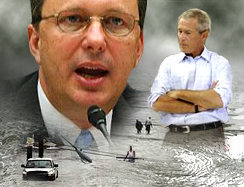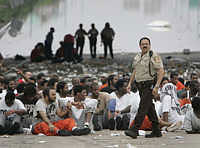Home / Older Categories
Subsections:
The Booker decision gave federal judges an opportunity to craft sentences that are appropriate to the offender and offense, guided but not bound by the federal sentencing guidelines. Appellate courts after Booker are to review sentences for reasonableness.
Many federal appellate courts have undermined the Booker decision by reversing sentences that fall below the advisory guideline sentence, and some have gone so far as to deem a guideline sentence presumptively reasonable, while giving less deferential scrutiny to sentences that are more lenient than the guidelines suggest. (Courts seem less troubled by sentences that exceed the advisory guideline.) These decisions have the practical effect of restoring the binding force of the guidelines, recreating the constitutional problem that Booker purported to solve: mandatory punishment for crimes that are never proved to a jury. (TalkLeft background on the Booker decision is collected here.)
The Supreme Court on Friday accepted review of two cases that question whether within-guideline sentences deserve more deferential review than those that fall outside the guidelines.
(2 comments, 471 words in story) There's More :: Permalink :: Comments
by TChris
The Louisiana State Medical Society has come out in support of Dr. Anna Pou, accused of ending the lives of four bedridden patients during the aftermath of Katrina. Meanwhile, Dr. Pou protested her innocence in a 60 Minutes appearance:
"No, I did not murder those patients," said Pou, who's been practicing medicine for more than 15 years. "I've spent my entire life taking care of patients. I have no history of doing anything other than good for my patients."
Here's the TalkLeft background on this ill-advised prosecution.
by TChris
Ethel Freeman is more than a symbol of the Bush administration's incompetence.
[Ethel Freeman's son] began pushing her toward the Superdome. A passing police officer told them to head instead to the riverfront convention center, where buses were expected to arrive. There were medical supplies, food and water at the Superdome, but people who took refuge at the convention center had none.
"He told me, 'The buses are coming. Wait here so you can get your mom on first,'" Freeman said Friday outside the building where his mother died.
Her last words were a supplication: "She asked me if the buses were coming," Freeman said. "I said 'Yeah, they're coming. And then I said, 'Ma, I'm going to pray to God to help me. And you pray to God to help you," he said.
A few minutes later, he realized she had stopped talking.
At a memorial today, Ethel Freeman's son recalled her death.
A fleet of buses arrived four days after she died - and when they did, Freeman was not allowed to take his mother's body, forced to board the bus at gunpoint. "It was like cutting me open and adding salt in the wound," he said.
(4 comments) Permalink :: Comments
by TChris
What to think of Michael Brown? His job with the Arabian Horse Association didn't work out, and only cronyism can explain his appointment to manage FEMA. Brown seemed less informed about conditions in New Orleans than CNN viewers, and more interested in fine dining than in the grueling work of disaster relief.
After being thrown overboard by the president who assured him he was doing a heck of a job, Brown worked hard to rehabilitate his image, with some success. Many of his criticisms of the Bush administration are justified, and the monumental failure of the federal response to Katrina cannot rest on Brown's shoulders alone. Still, there's little doubt that "Michael Brown was completely in over his head in running a federal agency and dealing with an actual disaster," and it's fair to argue that he "can't bring himself to actually take responsibility for his own failures."
A new series, "AIR: America's Investigative Reports," takes another look at Michael Brown, exposing "a pattern of Brownie's incompetence that merely foreshadowed the breathtaking malfeasance to come."
(2 comments) Permalink :: Comments
What else on the anniversary of Katrina? Two very different versions: Johnny Cash and Arlo Guthrie singing the City of New Orleans.
Johnny Cash
Arlo Guthrie
(5 comments) Permalink :: Comments


I haven't yet had an opportunity to watch the Katrina and New Orleans coverage but I'm sure you have. Here's an open thread on all things related to Katrina -- the devastation and the Adminstration's woefully inadequate response. Will this tar Bush's legacy for good?
(6 comments) Permalink :: Comments
by TChris
Racism -- or more broadly, intolerance based on characteristics of race, national origin, religion, and sexuality -- remains one of the most compelling challenges confronting the United States. The anniversary of Katrina drives the point home.
To live in the real world is to not be shocked when learning about how relief trucks passed by East Biloxi, a predominantly black community, to get to D'Iberville, a predominantly white middle-class community.
To live in the real world is to understand why the Red Cross station in East Biloxi barely served food, had no mobile health-care unit and was located in a depressing run-down building, while the Red Cross station in D'Iberville was pristine, well-stocked with food and supplies, and a full-service mobile health-care unit.
(3 comments, 273 words in story) There's More :: Permalink :: Comments
by TChris
The White House wants voters to believe that the president has played a significant role over the past year to help New Orleans rebuild. Despite all the president's speeches, disapproval of his response to Katrina remains high. As it should.
A year after Katrina, "only half of the New Orleans courthouse's 12 courtrooms have come back into service since judges returned to the flood-damaged building in June." Jail inmates are waiting for trials; many are waiting to meet their public defenders. And they've been waiting for a year. Judge Arthur Hunter is right to think that they shouldn't be kept waiting any longer.
Hunter says that especially given a shortage of public defenders, many indigent prisoners locked up even before the hurricane haven't talked to lawyers or been charged with crimes; he believes their rights have been being violated for too long and that therefore their releases warrant consideration on a case-by-case basis.
(1 comment, 286 words in story) There's More :: Permalink :: Comments
Next week's Katrina anniversary poses a huge vulnerability for Republicans as they head into the November elections. The White House has already started a massive PR campaign to spin the facts. Don't be fooled. Think Progress has published a timeline laying them all out.
(8 comments) Permalink :: Comments


Spike Lee's four hour film on Hurricane Katrina and the government's woefully inadequate response airs Monday and Tuesday nights on HBO:
One of the most poignant interviews in the Hurricane Katrina documentary "When the Levees Broke" is given by a man who lost his mother in the aftermath of the storm, filmmaker Spike Lee said Sunday. In the interview, Herbert Freeman recalls his mother's death at New Orleans Convention Center and the moment he had to leave her body there as he and other evacuees were taken out of the city.
"Before he got on a bus _ he had a piece of paper, wrote his name, his cell number and her name and placed the paper between her fingers, her body," Lee said on ABC's "This Week."
Just unbelievable. Here's a little action alert that should be easy to do.
(21 comments, 216 words in story) There's More :: Permalink :: Comments

It's too bad American media doesn't care enough to make this kind of documentary. Cheers to the BBC who Sunday night will be airing Prisoners of Katrina at 2200 BST on BBC Two.
In the aftermath of Hurricane Katrina, while thousands fled New Orleans, the city's prisoners were trapped. Fresh eye-witness accounts reveal what really happened to those left behind, and how crucial forensic evidence was simply washed away.
In September 2005, long after most people had fled a devastated city, inmates of Orleans Parish Prison - many of them shackled - were still waiting to be rescued from the blazing heat and the stinking floods.
One man, a chef jailed for an unpaid fine that should have at most netted a week's term, ended up spending 103 days in the jail, "abandoned without food, drink or sanitation as the waters rose."
"We were just left there to die," said Cardell Williams, a prisoner who spent two months in jail without ever being charged.
(12 comments, 674 words in story) There's More :: Permalink :: Comments
by TChris
Federal judges have more discretion to impose reasonable sentences than they had before the Supreme Court's Booker decision, but the limits of that discretion remain unclear. We know only that federal sentences must not be "unreasonable."
Was it unreasonable to sentence Michael Martin to 7 days of incarceration? The Eleventh Circuit thinks the sentence was just as unreasonable as the original imposition of straight probation, which it reversed. District Judge U.W. Clemon is testing the limits of his discretion, and might have kept ratcheting the sentence up a week at a time if the Eleventh Circuit hadn't tossed him off the case (decision here in pdf).
Michael Martin is a former HealthSouth executive who pled guilty to conspiracy to commit securities fraud and mail fraud.
(1 comment, 214 words in story) There's More :: Permalink :: Comments
| << Previous 12 | Next 12 >> |







